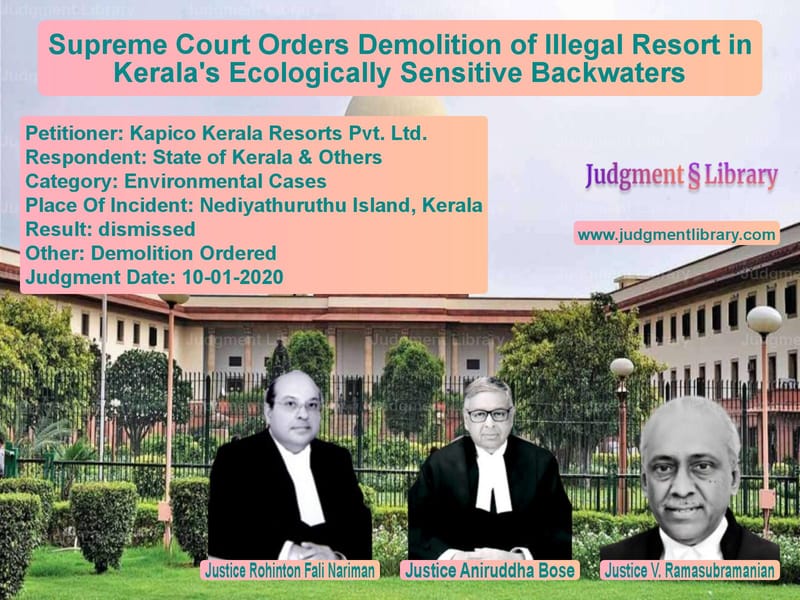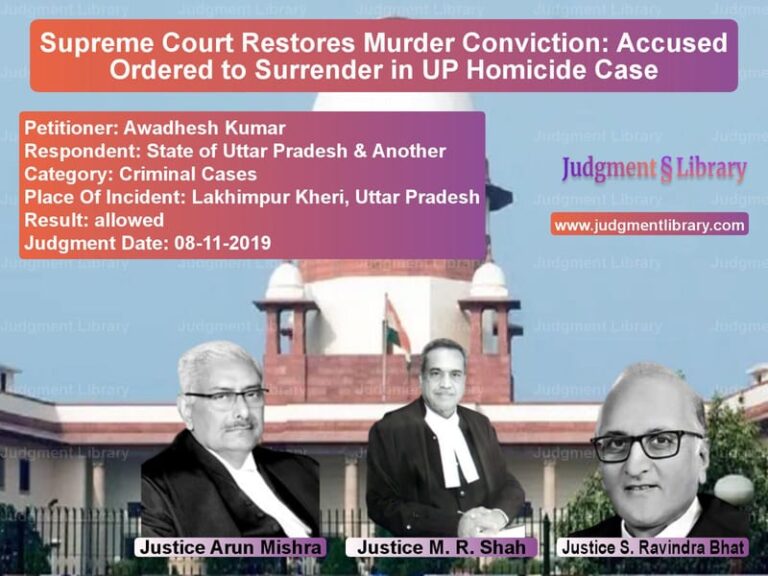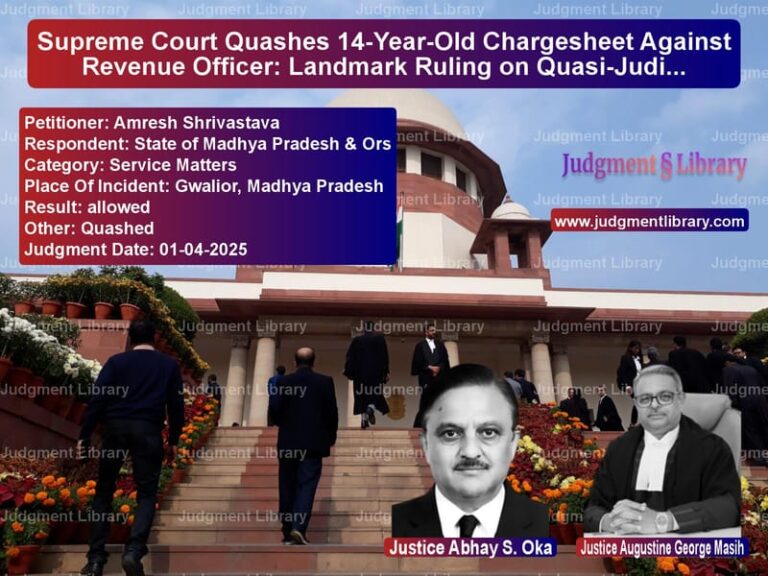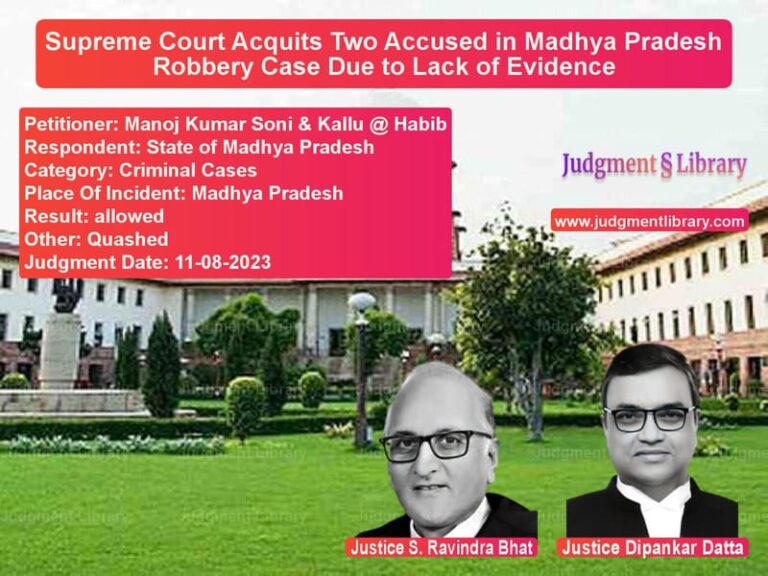Supreme Court Orders Demolition of Illegal Resort in Kerala’s Ecologically Sensitive Backwaters
The case of Kapico Kerala Resorts Pvt. Ltd. vs. State of Kerala & Others was a landmark environmental ruling where the Supreme Court upheld the demolition of a luxury resort constructed in violation of coastal regulation laws. The case revolved around the development of a resort in Nediyathuruthu Island, located in the ecologically sensitive Vembanad Lake, Alappuzha District, Kerala. The Court had to decide whether the resort violated the Coastal Regulation Zone (CRZ) Notification, 1991, and other environmental laws protecting backwater islands.
This case is significant because it clarifies the interpretation of CRZ regulations, reaffirms the protection of ecologically fragile areas, and sets a precedent against unauthorized commercial construction in protected zones.
Background of the Case
The dispute arose when local fishermen, environmental activists, and public welfare organizations challenged the construction of the resort, alleging that it violated CRZ regulations. The Kerala High Court ruled against the resort owners, ordering the demolition of illegal structures. The owners then appealed to the Supreme Court.
Legal and Environmental Concerns
The resort was constructed on an island that fell within the CRZ-I category, which includes ecologically sensitive areas such as mangroves, wetlands, and breeding grounds for marine life. The CRZ Notification of 1991 prohibited new constructions in such areas without proper environmental clearance. The central issue before the Court was whether the construction violated these regulations and whether prior approvals obtained by the resort owners could override environmental laws.
Arguments by the Petitioner
The appellant, Kapico Kerala Resorts Pvt. Ltd., presented the following arguments:
- The CRZ Notification of 1991 did not apply to small islands like Nediyathuruthu, and they were brought under regulation only in 2011.
- The company had obtained a No Objection Certificate (NOC) in 1996 and a building permit in 2007, before the 2011 CRZ Notification.
- The CRZ Notification of 1991 categorized small islands under CRZ-IV, which allowed some constructions.
- Since no island-specific CRZ study had been conducted, the restrictions should not apply.
- The project had received approvals from various government agencies, including the local panchayat.
Arguments by the Respondent
The State of Kerala and environmental organizations countered with the following arguments:
- Nediyathuruthu Island was an ecologically sensitive area covered under CRZ-I.
- The 1991 CRZ Notification applied to backwater islands, and the resort violated those regulations.
- The Kerala Coastal Zone Management Authority (KCZMA) had identified the area as vulnerable to ecological damage.
- The building permit issued by the local panchayat was invalid as it did not comply with CRZ norms.
- The construction was illegal and caused environmental damage.
Kerala High Court Ruling
The Kerala High Court ruled against the resort owners and directed:
- Demolition of illegal constructions on Nediyathuruthu Island.
- Restoration of the island’s ecological balance.
- Strict enforcement of CRZ rules to prevent future violations.
Supreme Court Judgment
The Supreme Court upheld the Kerala High Court’s decision, stating:
“The directions given by the High Court are perfectly in order in the interest of protecting the environment and ecology in the coastal area. The construction raised in violation of such regulations cannot be lightly condoned.”
The Court made the following key observations:
- Environmental regulations must be strictly enforced to protect ecologically sensitive areas.
- Obtaining permits from local authorities does not override national environmental laws.
- The resort was constructed in violation of CRZ regulations and needed to be demolished.
- Developers cannot use procedural loopholes to justify illegal construction.
Legal Precedents Considered
The Supreme Court referred to several landmark environmental rulings:
- Olga Tellis vs. Bombay Municipal Corporation – Upholding the right to a clean environment.
- Piedade Filomena Gonsalves vs. State of Goa – Holding that CRZ violations cannot be regularized.
- S. Jagannath vs. Union of India – Emphasizing the importance of environmental conservation.
Final Outcome
The Supreme Court dismissed the resort owners’ appeal and ordered:
- The demolition of all illegal structures on Nediyathuruthu Island.
- Restoration of the land to its original ecological condition.
- Strict enforcement of CRZ rules to prevent future violations.
This judgment reinforced the importance of environmental conservation and ensured that ecologically sensitive areas are not exploited for commercial purposes. It sent a strong message that legal and regulatory compliance must be upheld when dealing with ecologically fragile zones.
Petitioner Name: Kapico Kerala Resorts Pvt. Ltd..Respondent Name: State of Kerala & Others.Judgment By: Justice Rohinton Fali Nariman, Justice Aniruddha Bose, Justice V. Ramasubramanian.Place Of Incident: Nediyathuruthu Island, Kerala.Judgment Date: 10-01-2020.
Don’t miss out on the full details! Download the complete judgment in PDF format below and gain valuable insights instantly!
Download Judgment: Kapico Kerala Resort vs State of Kerala & Ot Supreme Court of India Judgment Dated 10-01-2020.pdf
Direct Downlaod Judgment: Direct downlaod this Judgment
See all petitions in Environmental Cases
See all petitions in Property Disputes
See all petitions in Landlord-Tenant Disputes
See all petitions in Judgment by Rohinton Fali Nariman
See all petitions in Judgment by Aniruddha Bose
See all petitions in Judgment by V. Ramasubramanian
See all petitions in dismissed
See all petitions in Demolition Ordered
See all petitions in supreme court of India judgments January 2020
See all petitions in 2020 judgments
See all posts in Environmental Cases Category
See all allowed petitions in Environmental Cases Category
See all Dismissed petitions in Environmental Cases Category
See all partially allowed petitions in Environmental Cases Category







